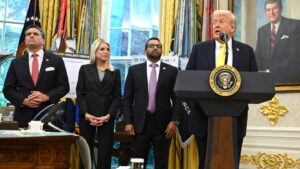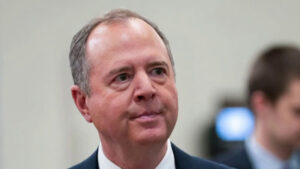Congress
The Senate has met a problem even a ‘gang’ can’t solve
When Washington first woke up to a government shutdown earlier this month, there was one hope for a quick exit: A bipartisan clutch of rank-and-file senators were at least talking.
There was reason for optimism. Past groups had evolved into “gangs” that had figured out some of Capitol Hill’s most intractable disputes.
But that’s not the trajectory so far. Three weeks into the shutdown, there are no signs that the conversations are anywhere close to generating a solution to what is now the second-longest shutdown in U.S. history.
“You can lead a horse to water but you can’t make it drink,” said Sen. Mike Rounds (R-S.D.), who has been involved in the conversations that sprang up as Congress barreled over the funding cliff in early October but have since stalled. “I don’t see that there’s a path forward at this point.”
Senators don’t even agree on whether there are still bipartisan talks taking place at all, let alone on what it would take to break the stalemate. If they agree on anything, it’s that they aren’t a gang, and they aren’t negotiating.
It’s a stark shift from early 2018, when a Senate gang helped negotiate a deal to end a short shutdown during President Donald Trump’s first term. They built on that with a series of bipartisan deals — including multiple coronavirus relief bills and an infrastructure agreement under Trump’s successor, Joe Biden.
But the Senate has changed dramatically since then. Dealmaking senators such as Rob Portman (R-Ohio), Joe Manchin (I-W.Va.), Mitt Romney (R-Utah) and Kyrsten Sinema (I-Ariz.) have retired, hollowing out the corps of lawmakers with any experience crossing the aisle.
The personnel drain has been exacerbated by the sharp battle lines that have been drawn by party leaders as well as deep frustration with an administration that has taken a sledgehammer to a government funding process that once provided a basic framework for bipartisanship inside the Senate.
“Right now … there’s not enough trust between us,” said Sen. Chris Coons (D-Del.), who has a long history of negotiating with Republicans.
He and others noted the challenges for the would-be negotiators are vast and involve figuring out how to bridge sweeping policy and political divides.
The shutdown impasse isn’t only about government spending; some Democrats have demanded that any off-ramp deal include an extension of key Affordable Care Act subsidies that are set to expire at the end of the year — potentially leaving millions uninsured, according to estimates from the Congressional Budget Office.
Democrats say they want a bipartisan negotiation on extending the credits, while Republicans say they won’t negotiate while the government is closed down. None of the would-be dealmakers have strayed from those positions set out by their respective party leaders.
The Senate’s bipartisan talks have instead focused on what would happen after the government reopens. Lawmakers involved have floated several ideas, including the possibility of having a vote to reopen the government followed immediately by a vote on an extension of the insurance subsidies.
But that hasn’t been enough to get Democrats to bite. Asked Tuesday if lawmakers were close to finding a path out of the shutdown, Sen. Jeanne Shaheen (D-N.H.) replied dryly, “Not that I have seen.”
Asked why senators haven’t broken out the “talking stick” — the device the 2018 shutdown-solving group used to manage their bipartisan meetings — Sen. Lisa Murkowski (R-Alaska), a perennial gang member, argued that there was little incentive in either party to break ranks at the moment.
“Both sides think there is political advantage in sticking with the positions that they have,” she added.
The senators aren’t completely throwing in the towel, and some of their colleagues still see the sputtering bipartisan talks as the best path out of the shutdown. But there are simmering flashes of frustration from Shaheen and others in the group that what is needed is hands-on involvement from top leaders to break the stalemate — including from Trump.
“I think he’s an important part of it,” Murkowski said.
Senators believe they are nearing a crucial juncture: Trump will leave Friday for a weeklong trip to Asia, and there’s some private grumbling on Capitol Hill that he’s been too deeply engaged in foreign affairs as the country lumbers deeper into the shutdown. Coming to a deal to end it will be difficult as long as he is out of the country, they think.
But most Republicans don’t believe Trump should come to the table until after the government is reopened — and GOP senators left a lunch with the president at the White House Tuesday pledging to remain unified behind their funding strategy. Democrats, meanwhile, have been emboldened by the “No Kings” rallies against the Trump administration over the weekend as well as encouraging polling that appears to back up their shutdown stance.
Even as senators downplay hopes that a bipartisan gang will ride to the rescue, the rank-and-file group is taking care to keep lines of communication open given the freeze-out between Democratic leaders and the White House. A Tuesday request to Trump from Senate Majority Leader Chuck Schumer and House Minority Leader Hakeem Jeffries for a meeting was quickly swatted away by the White House, in keeping with the wishes of top GOP leaders.
Some cross-aisle outreach continued this week, according to three people familiar with the matter granted anonymity to disclose private discussions. And while there wasn’t much public progress to show for it, Shaheen said Tuesday it hasn’t been a total wash. But, she added, they needed help from higher powers.
“I think people have moved on both sides,” she said, but it was essential that “the leaders in both houses and both sides sit down with the president and negotiate an end to the shutdown. I think that’s in everyone’s interest.”
Congress
Senators eye sanctions vote after Trump targets Russian oil
The bipartisan authors of sweeping Russia sanctions legislation are hoping the Senate is finally ready to consider their bill after President Donald Trump hit Moscow’s energy sector with penalties this week.
Sen. Lindsey Graham (R-S.C.), a close Trump ally and coauthor of legislation taking aim at Russian oil and gas revenue, said Congress “should continue the pressure.” He said the Senate could schedule a “Russia week” in which it takes up several bills related to Moscow’s war against Ukraine.
Graham and Sen. Richard Blumenthal (D-Conn.) have been pressing for months for a vote on their measure to implement steep tariffs on countries that import Russian energy and secondary sanctions on foreign companies that aid in its energy production.
“We have the ability to create a sanction regime that would be beyond legal challenge,” Graham told reporters, explaining why congressional action would be prudent beyond Trump’s unilateral moves. He added that “Trump would be the quarterback.”
Majority Leader John Thune said last week he was ready to advance the long-stalled sanctions package, predicting last week the bill will be brought up within a month. But he struck a more cautious note Thursday.
“As you know, I’ve been interested for some time in getting the sanctions bill up on the floor,” he said. “We’re trying to do … that in concert and coordination with the White House to make sure that we’re giving them the best possible opportunity to succeed in getting Russia to the table.”
Separately, Sen. Jim Risch (R-Idaho), chair of the Senate Foreign Relations Committee, called a potential vote on sanctions “a work in progress” Thursday.
Thune and Graham have worked with the White House to smooth over technical issues in the bill, but progress halted last week after Trump spoke to Russian President Vladimir Putin and announced plans for a summit meeting in Hungary.
Those plans have since collapsed, prompting the Treasury Department to sanction Russia’s two largest oil companies Wednesday. Now, advocates for a tougher line against Putin want the Senate to follow up with the Graham-Blumenthal bill, which has more than 80 cosponsors.
“I think it establishes a trajectory for passing our sanctions bill, and there’s no excuse for delay,” Blumenthal said.
Asked if Trump supports the sanctions bill, Thune said as a “general matter, yes,” but added there were things the White House wants incorporated and that “we’re in conversation with them.”
Graham and Blumenthal floated the possibility that other bills could come to the floor, including measures allowing frozen Russian assets to be repurposed for Ukraine’s use and designating Russia as a state sponsor of terrorism. Thune said discussions are underway about votes on those bills.
Minority Leader Chuck Schumer, meanwhile, said off the floor Thursday that the Senate should advance “a strong, tough sanctions bill.”
Calen Razor contributed to this report.
Congress
Obamacare ‘auto-enrollees’ are key target as Republicans formulate tax-credit extension plan
As Republicans formulate a plan to potentially extend key health insurance subsidies that are at the center of the government shutdown fight, House Energy and Commerce Chair Brett Guthrie warned in an interview Tuesday that any extension would “absolutely” need to include a crackdown on so-called “phantom” Obamacare enrollees.
The move is sure to spark a clash with Democrats, who successfully challenged similar provisions from Guthrie’s committees when they were included in the GOP megabill that passed over the summer. But now Republicans have more leverage as Democrats push for the continuation of tax credits that are set to expire Dec. 31.
“If there’s going to be an extension of those tax credits, the program integrity stuff … absolutely needs to be in place,” Guthrie said.
He was referencing a suite of Republican policies that would put new curbs on reenrollment for the enhanced insurance subsidies that are at the core of Democrats’ shutdown demands. Republicans and influential conservative health lobbyists complain the status quo leads to waste, fraud and abuse.
“Once you sign up, you’re on it forever,” Guthrie said.
Democrats argue those complaints aren’t grounded in reality, and the GOP push could set off a larger fight over how Americans enrolled in the program. Many Democrats, especially progressives, are worried about adding new barriers to access coverage, which they argue would disproportionately hit low-income Americans.
When Republicans tried to insert new curbs in their party-line megabill, Senate Democrats successfully challenged the provisions with the chamber’s parliamentarian.
Now House and Senate GOP leaders are making a big push for a crackdown on auto-enrollment as they begin talks among themselves and with White House officials about a possible subsidy extension and other conservative health care policy initiatives.
Senate Majority Leader John Thune in particular frequently references phantom enrollment as one problem Republicans want to tackle. At least some Democrats are open to negotiating on the topic, and there have been quiet, informal conversations in the Senate about that piece specifically.
“I understand what their issue is,” Sen. Mark Kelly (D-Ariz.) said in an interview Thursday. “And if they would work with us and have a real negotiation on how we fix the premiums, I think that is something that we could address.”
Kelly confirmed he’s talked to “several” Republican colleagues about the policy, adding, “I think they have some points.” The other “other side” of the argument, he said, is that “folks that don’t have a lot of means, when you put barriers in front of them, they tend to drop their health insurance.”
Robert King contributed to this report.
Congress
101 Republicans to defend community finance program from Trump cuts
More than 100 Republican lawmakers are expected to sign on to a letter pushing back on the Trump administration’s move to eliminate a popular, bipartisan community development finance fund that helps small businesses and home buyers access capital in areas of the country underserved by big banks.
The congressional Republicans are pressing the Trump administration to reverse its decision to fire all employees at the Treasury Department’s Community Development Financial Institutions Fund, according to the draft letter. The letter is expected to be sent to the administration Thursday.
The bicameral letter, led by Rep. Young Kim (R-Calif.), a member of the House Financial Services Committee, and Sen. Mike Crapo (R-Idaho), who chairs the Senate’s Community Development Finance Caucus, is addressed to Treasury Secretary Scott Bessent and Office of Management Director Russ Vought. The letter “strongly urge[s] the Administration to continue carrying out the statutory obligations of the CDFI Fund that are essential to ensuring private investments reach our states and districts.”
The large wave of GOP lawmakers that signed the letter signals widespread support among congressional Republicans for a program that the Trump administration has attempted to eviscerate.
The list of signatories obtained by Blue Light News includes 27 Senators and 74 House members. The letter was signed by key Republicans, including Sens. Tim Scott (R-S.C), Lisa Murkowski (R-Alaska), Susan Collins (R-Maine), Thom Tillis (R-N.C.), Chuck Grassley (R-Iowa), Mike Rounds (R-S.D.) and Reps. Bill Huizenga (R-Mich.), Mike Lawler (R-N.Y.) Mike Flood (R-Neb.), and Andrew Garbarino (R-N.Y.), among others.
The CDFI Fund awards federal dollars to CDFIs, which are community banks, credit unions and other financial institutions, that lend and provide other types of capital as part of a public-private partnership designed to increase the accessibility for communities traditionally underserved by the banking industry.
-
Uncategorized12 months ago
Bob Good to step down as Freedom Caucus chair this week
-

 Politics8 months ago
Politics8 months agoFormer ‘Squad’ members launching ‘Bowman and Bush’ YouTube show
-

 The Josh Fourrier Show12 months ago
The Josh Fourrier Show12 months agoDOOMSDAY: Trump won, now what?
-

 The Dictatorship8 months ago
The Dictatorship8 months agoPete Hegseth’s tenure at the Pentagon goes from bad to worse
-

 Politics8 months ago
Politics8 months agoBlue Light News’s Editorial Director Ryan Hutchins speaks at Blue Light News’s 2025 Governors Summit
-

 The Dictatorship8 months ago
The Dictatorship8 months agoLuigi Mangione acknowledges public support in first official statement since arrest
-

 Politics12 months ago
Politics12 months agoWhat 7 political experts will be watching at Tuesday’s debate
-

 Politics8 months ago
Politics8 months agoFormer Kentucky AG Daniel Cameron launches Senate bid





